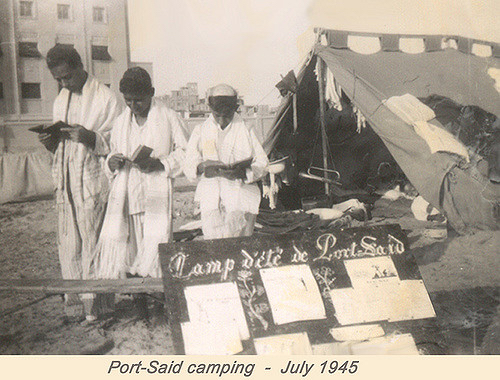Even when nothing is going on in Film Socialisme, the impulse to cry out, “What’s going on?” can be overwhelming. It’s hard to tell the people on screen apart; it’s harder to determine whether this involuntary sorting exercise matters. We may see the boy who wears the CCCP T-shirt repeatedly during the film’s middle section. We may understand, eventually, that he is the son of the couple that run a filling station. But figuring out whether that attire reflects the politics of his parents and, if so, how it does so — inversely? nostalgically? ironically? — feels impossible.
Does it mean something that the boy is using a microphone to “conduct” while he is wearing the shirt? Does the fact that he appears to fall asleep afterwards, his head resting on the footstool from which he led the pre-recorded orchestra, add anything to our knowledge of his world? Or does this semantically pregnant interlude merely constitute another surreal detail, like the llama his sister leads around the petrol pumps, that dupes us into looking for significance where there isn’t any?
That Jean-Luc Godard is still capable of baffling audiences in this way, half a century after he first went to war against the conventions of cinema, demonstrates that it wasn’t the sort of conflict that can be won. But we would be foolish to reduce his stubborn refusal to surrender to the romance of the lost cause.
There’s something honorable about Godard’s willingness to incite confusion, annoyance and incredulity, at the expense of the sort of financial rewards available to famous artists nearing the end of their careers. A picture sporting the light touch of Breathless or even the “lite” surrealism of Weekend could easily be marketed as a return to form. And it would surely boost sales of his back catalogue, regardless of the reviews.
The irony is that Godard can’t or won’t do this because he keeps returning to form. Film Socialisme showcases most of the techniques the director has deployed over the years, from the use of agit-prop intertitles to an often alarming disjunction between sound and image. The problem, in terms of its marketability, is that they are piled on top of each other with little restraint, resulting in a palimpsest of auteurial tics. In other words, as has been the case with almost all of his post-60s films, Film Socialisme sometimes seems to be nothing but form.
This is why Godard’s intransigence, his refusal to revisit the pop sensibility of his earlier work, is easily perceived as self-indulgence. He is hardly an autobiographical filmmaker. Yet the continuity in his craft, year after year, has resulted in an oeuvre that reflects his own desires to a painfully obvious degree. First and foremost, it is clear that he does not wish to be popular.
By repeatedly deploying techniques intended to alienate audiences — and mostly succeeding, as he does with Film Socialisme — Godard proves that he isn’t making movies to please anyone, unless it be the few critics and fans who hold his recent work in high regard or, perhaps, himself. While those techniques probably make his pictures easier to produce, since he and his crew don’t have to worry about being “professional,” they are effectively a necessity born of virtue.
Godard could surely raise the capital to make what Hollywood considers a “real” movie. But that would require him to stop driving viewers to ask “What’s going on?” And the goal of provoking that response appears to be too important for his self-conception as an artist to abandon it in the name of marketability. Although he has relentlessly cleared away the supports for identity at the narrative level, those points where moviegoers identify with a character’s plight and thereby reinforce their own sense of self, he has built up his own brand in the process.
This is the foundational paradox of avant-garde cinema. From Dziga Vertov to present-day experimental filmmakers, the war on conventions has largely been a war on the conventions of narrative. Even though Godard started his career as a critic writing about American films that were conservative in their approach to storytelling, with memorable characters passing through a clearly defined story arc, he has, if Film Socialisme is any indication, ended up in a place where such concessions to storytelling are anathema.
Our desperate need for continuity, to determine what does manage to “go on,” in spite of all the forces conspiring to stop meaning in its tracks, drives us to retell pictures like Film Socialisme along conventional lines. That’s why the summary on the back of the English-language DVD gives us a head start. The film’s second section, we learn, features “a struggling rural French rest stop, whose owners, seeking to change their fate, are running for office.” But this is by no means obvious when we watch the film for the first time.
On the contrary, the interpolation of disjointed, poetic ruminations with scenes of day-to-day existence, many of them also being filmed by a camerawoman fond of extreme, low-angle close-ups, makes this part of the film deeply confusing. The station owners’ children seem bored, more than anything, though the summary advises us that they “point towards an alternate future.”
While such an interpretation makes sense, given the film’s title and its director’s long history of left-wing posturing, an awful lot of work must be done to make it. Indeed, a first viewing of Film Socialisme is far more likely to leave the impression that sequences are only connected together by the logic of their sequential procession. Even the most connotatively loaded details — the boy’s CCCP T-shirt, the mutterings about the wealthy Mr. Goldberg during the cruise-ship scenes in the film’s first section, the fleeting images of an Egypt ripe for revolution — do little to beat back the entropy threatening to engulf the film.
Maybe that’s Godard’s point, that our demand to know what’s going on represents a dangerous mode of denial. Death is inevitable. And that makes the search for meanings that endure an attempt to evade that fact. To reframe that insight in terms of the film’s title, we might say that the investment in continuity, however “natural” it seems, is the primary obstacle to socialism in the Marxist sense, the stumbling block that has faced every International. Because in a world whose rapid changes far outstrip our individual capacity for change, the only solution may be to abandon our belief in individuality itself.
During the film’s middle section, we see the station owners’ daughter in close-up, silent, as political speculations are voiced from off-screen space: “You want more power? No power. A society, not a state. . . The dream of the State is to be alone. The dream of individuals is to be two.” If, as this formulation suggests, these dreams are fundamentally incompatible, then avant-garde cinema’s war on narrative and, by extension, the identity it secures is ultimately a war on the State.
This is the message Film Socialisme seeks to communicate, at any rate. In that regard, the picture can be regarded as a retroactive mission statement for Godard’s career as a political filmmaker. The self-indulgence that critics have lamented, his seeming reluctance to make movies for other people, is cast in a different light if his entire project is conceived as an assault on the self, that policing of boundaries that keep individuals from dissolving into the stream of time.
The third and final section of Film Socialisme, a historical montage that takes us from Ancient Egypt and Greece through the Anarchist Barcelona of the Spanish Civil War to a contemporary Europe haunted by the legacy of efforts to divide and sort extrapolates this point into an argument appropriate for the present conjuncture, calling into question the fundamental distinctions between “West” and “East,” “North” and “South” that stand in the way of true freedom.
It is strangely fitting, in that regard, that the montage — and the picture — closes with a literal palimpsest. First we see the familiar FBI warning against “commercial use or duplication” of copyrighted content. And then, dissolving into the frame from underneath that image, one of Godard’s tell-without-tale intertitles, in his “trademark” all-capital Helvetica: “QUAND LA LOI N’EST PAS JUSTE LA JUSTICE PASSE AVANT LA LOI (“When the Law is unjust, Justice comes before the Law”).
In a world where the Law and its enforcer the State are bent on preventing duplication, the passage from the one into the many, the purpose of a socialist cinema, its raison d’être, is to make the case against the persistence of being. Because it is the belief that people can outlive their bodily existence through things, the property disposed of in their name, that prevents us from embracing the possibility of a world without borders.
Screen shots from Film Socialisme courtesy of Jean-Luc Godard. Published under a Creative Commons license.










Very interesting piece! You do a fine job of describing why someone like me, who loves the Godard of Breathless-through-Weekend, hasn’t bothered to see any of his films of the last 40 years or so. But you also do a fine job of describing why you still find his work intriguing.